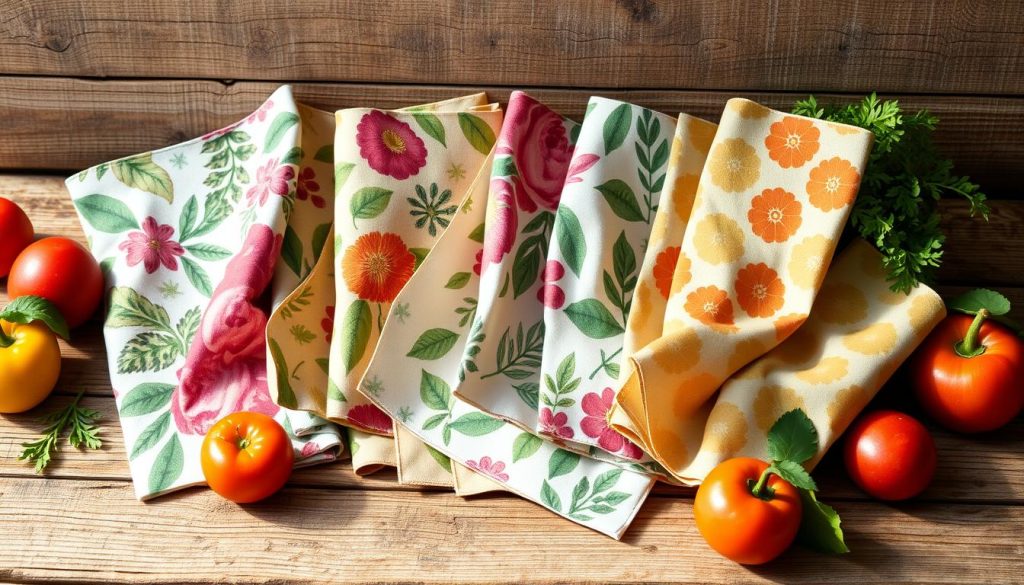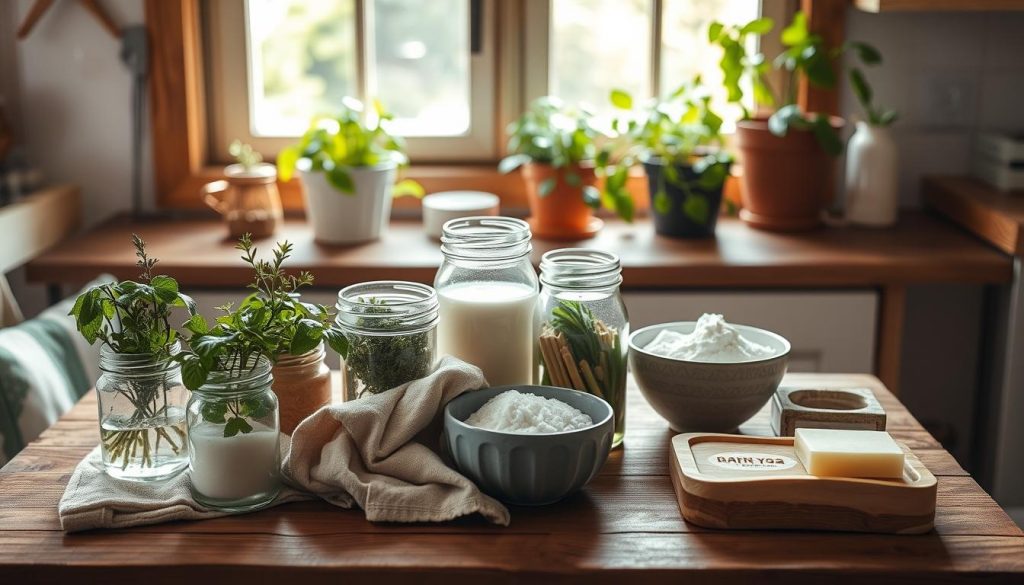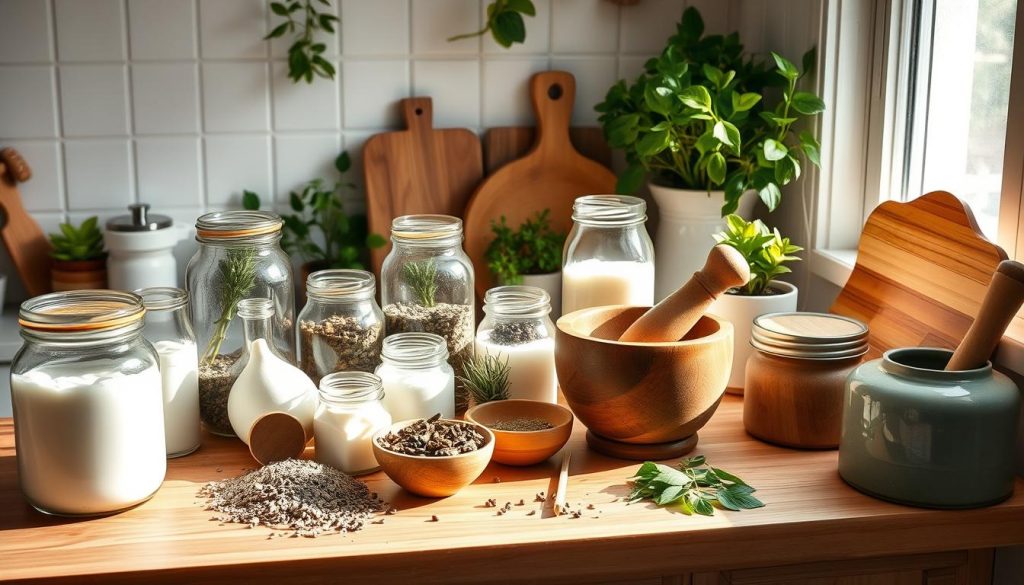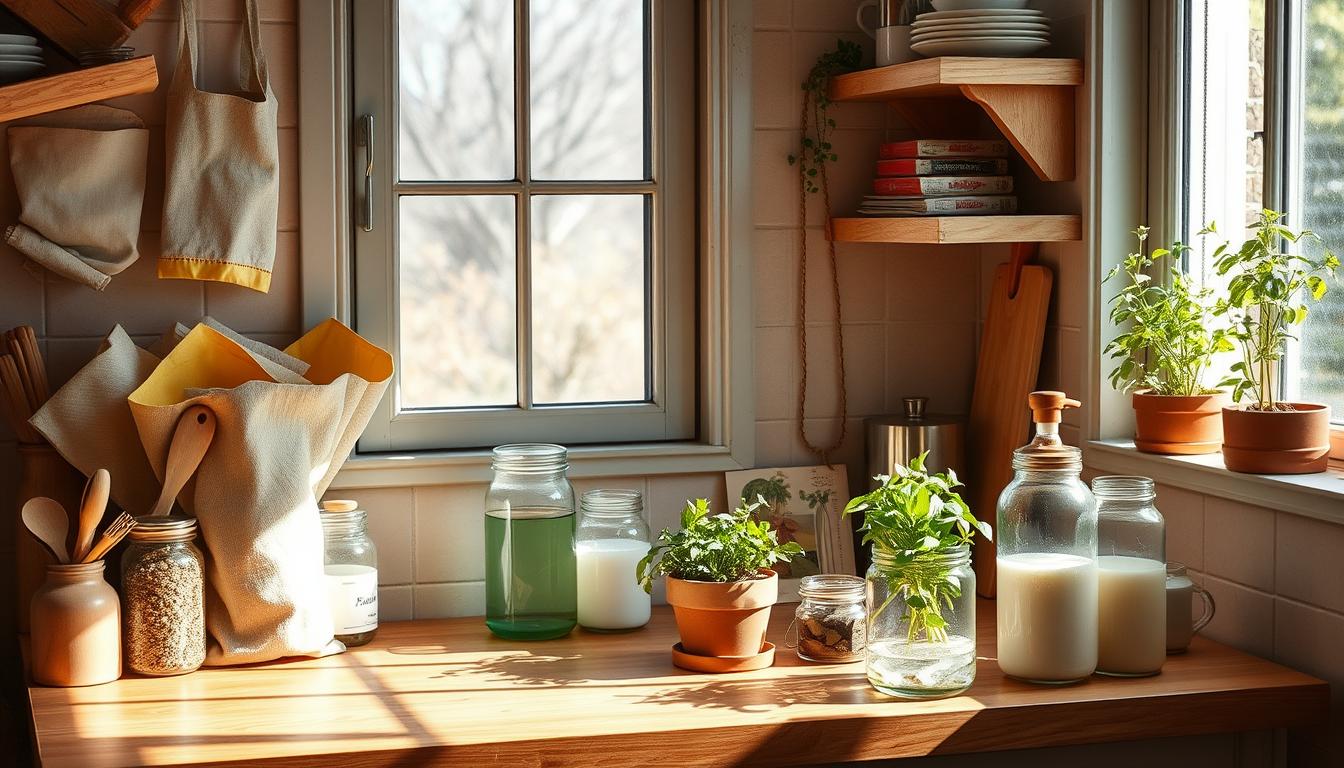Welcome to a world where eco-friendly home projects and sustainable DIY ideas can make your living space green. By making simple, homemade zero waste items, you help the environment and improve your life. It’s a win-win situation.
Living sustainably is easy. With a few simple projects, you can cut down on waste and make your home unique. Let’s explore some creative and practical ways to make your home eco-friendly.
The Importance of Going Zero Waste
Choosing a zero waste lifestyle is more than a trend. It’s a promise to help create a sustainable future. By following zero waste living tips, we all play a part in making our planet healthier. This approach focuses on reducing, reusing, and recycling to cut down on waste in landfills and oceans.
Understanding the Zero Waste Concept
Zero waste living is about making a conscious effort to cut down on waste. It promotes using sustainable crafts to give old items new life. This means composting and avoiding single-use plastics. Every small step we take helps make a big difference for our planet.
Benefits of Living a Zero Waste Lifestyle
Adopting a zero waste lifestyle has many benefits. It helps reduce our impact on the environment by saving natural resources and energy. It also improves our health by avoiding harmful chemicals in regular products. Plus, it can save money since reusing items is often cheaper than buying new ones.
My Personal Journey Towards Sustainability
My journey to zero waste started with a wish to make a real difference. I began by adding simple, eco-friendly crafts to my daily life, like making reusable wraps and cleaning products. These small steps grew into a lifestyle that not only reduced my waste but also encouraged others to join the zero waste movement.
Essential DIY Zero Waste Products for Beginners

Starting your zero waste journey is exciting and rewarding. By making DIY reusable items, you can cut down on waste and save money. Here are three key DIY zero waste products to begin with.
Reusable Beeswax Wraps
Reusable beeswax wraps are great for replacing plastic wraps. They’re simple to make and perfect for covering bowls, wrapping sandwiches, or storing produce. Just melt beeswax and spread it on cotton fabric to make a green and reusable kitchen item.
Eco-Friendly Cleaning Supplies
Making your own cleaning supplies at home is a smart move. It reduces single-use plastics and harmful chemicals. Mix baking soda, vinegar, and essential oils to create strong, natural cleaners for your home. These DIY items are good for the planet and your health.
Homemade Body Scrubs
Homemade body scrubs are a luxurious, eco-friendly way to care for your skin. Use sugar, salt, and coconut oil to make scrubs that soften and refresh your skin. Plus, using glass jars or other containers for these scrubs helps reduce waste.
How to Make Your Own Reusable Bags
Making your own reusable bags is a great DIY project. It helps cut down on plastic waste and adds a personal touch to your day. These bags are not only useful but also eco-friendly.
Selecting Sustainable Materials
It’s important to pick the right materials for your bags. Choose strong, eco-friendly fabrics like organic cotton, linen, or recycled materials. These options are good for the planet and last a long time.
Step-by-Step Sewing Guide
Even if you’re new to sewing, making reusable bags is easy. Here’s a simple guide to help you get started:
- Measure and cut your fabric to 14×18 inches for a standard size.
- Fold the fabric in half, with the wrong sides together.
- Sew the sides and bottom, leaving the top open.
- Make handles by cutting two fabric strips (4×22 inches) and sewing them to the top.
- Turn the bag right-side out and double-stitch the seams for extra strength.
Customizing for Style and Function
Adding your own style to your bags is fun. You can add pockets, pick bright fabrics, or even embroider them. This makes them perfect for gifts or your own use.
Here’s a quick look at common materials and their benefits:
| Material | Sustainability | Durability |
|---|---|---|
| Organic Cotton | High | Very Strong |
| Linen | High | Strong |
| Recycled Fabric | Very High | Strong |
Simple Recipes for Natural Household Cleaners

Making your own natural cleaners is a great eco-friendly project. It reduces harsh chemicals and waste. Here are some easy recipes using common items.
All-Purpose Cleaner with Vinegar
Vinegar is a strong cleaner. Mix equal parts water and vinegar in a spray bottle. Add a few drops of essential oil for a nice smell. It works well on surfaces, windows, and mirrors.
Citrus-Powered Floor Cleaner
Use citrus fruits for a fresh floor cleaner. Mix 1/2 cup of lemon juice with a gallon of hot water. The acidity in citrus fruits removes grime and makes floors shine. It’s a simple yet effective eco-friendly craft.
Baking Soda and Essential Oil Innovations
Baking soda is very useful in eco-friendly projects. Mix a cup of baking soda with a few drops of essential oil. Use it to clean sinks and tubs. It naturally removes stains and odors.
| Ingredient | Use | Benefits |
|---|---|---|
| Vinegar | All-purpose cleaner | Cuts through grease and grime |
| Lemon Juice | Floor cleaner | Natural disinfectant |
| Baking Soda | Scrub cleaner | Deodorizes and removes stains |
| Essential Oils | Added to cleaners | Provides pleasant scent and additional cleaning power |
Crafting Safe and Sustainable Personal Care Products

Making your own personal care products is rewarding and good for the planet. It lets you avoid harmful chemicals and reduce waste. You can make toothpaste, mouthwash, shampoo bars, and natural deodorants with love and care.
DIY Toothpaste and Mouthwash
Making toothpaste and mouthwash at home is easy. For toothpaste, mix baking soda with coconut oil and peppermint essential oil. It’s a great alternative to store-bought toothpaste without synthetic additives.
For mouthwash, dissolve salt in warm water and add baking soda. Add essential oils like tea tree or mint for a refreshing taste. It’s a great DIY idea for keeping your mouth clean.
Homemade Shampoo Bars
Shampoo bars are a great alternative to liquid shampoos. Mix coconut oil, olive oil, and castor oil with lye and essential oils. Pour into molds and let cure for weeks. You get a solid, waste-free shampoo bar that’s good for your hair.
Natural Deodorants That Work
To make a natural deodorant, mix baking soda, arrowroot powder, and coconut oil. Add essential oils like lavender or eucalyptus for scent and antibacterial benefits. It’s a skin-friendly, eco-friendly deodorant option.
Using these DIY alternatives in your routine helps the planet and you. You’ll know exactly what’s in your products and feel good about your choices.
Creative Ways to Upcycle Everyday Items
Upcycling is key to living zero-waste by breathing new life into discarded items. This section will spark your creativity with ideas like turning glass jars into chic storage, old clothes into handy tote bags, and tin cans into stylish planters. These projects not only help the planet but also make your home more unique and personal.
Transforming Glass Jars into Storage Solutions
Upcycling glass jars is a great way to make useful items. I love making them into stylish storage for the kitchen, bathroom, or office. Just add a label and some DIY chalk paint for a chic look.
Upcycling Old Clothing into Tote Bags
Upcycling old clothes is another favorite of mine. I turn old jeans and t-shirts into strong tote bags. Adding pockets or decorations makes them unique and useful. It’s a way to save fabric and get bags that are just right for you.
Using Tin Cans for Stylish Planters
Lastly, making planters from tin cans is fun. They’re great for small plants and herbs. With a bit of paint and decoration, they become beautiful additions to any room. It’s a creative way to make something useful from something that was once waste.
Tips for Maintaining a Zero Waste Lifestyle
Starting a zero waste lifestyle is just the first step on a rewarding journey. To keep going, make zero waste habits a part of your daily life. This not only helps the environment but also makes it more fun and less scary.
Incorporating Zero Waste Habits into Daily Life
Begin with small, easy changes every day. Use reusable bags, bottles, and utensils to cut down on single-use items. Try making your own cleaning and personal care products using eco-friendly crafts.
Also, keep your recycling and composting organized. This helps manage waste at home better.
Connecting with Local Zero Waste Communities
Joining local zero waste groups is a great tip. These communities offer lots of info, resources, and support. You can meet others at events or online, sharing ideas and solutions.
Many local groups also teach eco-friendly crafts. This boosts your skills and connects you with others who care about the planet.
Continuous Learning and Improvement in Sustainability
It’s important to keep learning and growing. Sustainability is always changing, with new ideas and discoveries. Stay updated by reading books, blogs, and attending events.
Be open to changing your ways as you learn. This keeps your commitment to zero waste strong and effective.

